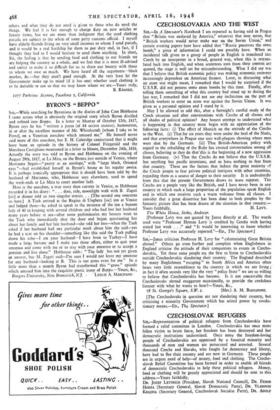BYRON'S " BEPPO "
Sra,—While searching for Byroniana in the diaries of John Cam Hobhouse I came across what is obviously the original story which Byron distilled and refined into Beppo. In a letter to Murray of October 12th, 1817, Byron says he has " written a poem (of 84 octave stanzas), humourous, in or after the excellent manner of Mr. Whistlecraft [whom I take to be -Frere], on a Venetian anecdote which amused me." He himself never said more of this anecdote, but E. H. Coleridge conjectured that it might have been an episode in the history of Colonel Fitzgerald and the Marchesa Castiglione mentioned in a letter to Moore, December 24th, 1816. Actually the story was told to Byron and Hobhouse on the evening of August 29th, 1817, at La Mira, on the Brenta just outside of Venice, where Marianna Segati—" pretty as an antelope," with "large black, Oriental eyes "—had established herself in Byron's house as his regular arnica. It is perhaps ironically appropriate that it should have been told by the husband of Marianna, who, Hobhouse says elsewhere, used to spend the week-ends at La Mira to court another lady.
Here is the anecdote, a true story then current in Venice, as Hobhouse recorded it in his diary: " . . . dine, ride, moonlight walk with B. Zagati [sic] at dinner told us two singular stories. . . [The second one concerns us here.] A Turk arrived at the Regina di Unghera [sic] inn at Venice and lodged there—he asked to speak to the mistress of the inn a buxom lady of 40 in keeping with several children and who had lost her husband many years before at sea—after some preliminaries my hostess went to the Turk who immediately shut the door and began questioning her about her family and her late husband—she told her loss—when the Turk asked if her husband had any particular mark about him she said—yes he had a scar on his shoulder—something like this said the Turk pulling down his robe—I am your husband—I have been to Turkey—I have made a large fortune and I make you three offers, either to quit your amoroso and come with me or to stay with your amoroso or to accept a pension and live alone." Hobhouse adds: "The lady has not yet given an answer, but M. Zagati said—I'm sure I would not leave my amoroso for any husband—looking at B. This is too gross even for me." In a little more than a month Byron had transformed this " gross " episode which amused him into the exquisite poetic irony of Beppo.—Yours, &c., Rutgers University, New Brunswick, N.J. • LESLIE A. MARCHAND.






























 Previous page
Previous page